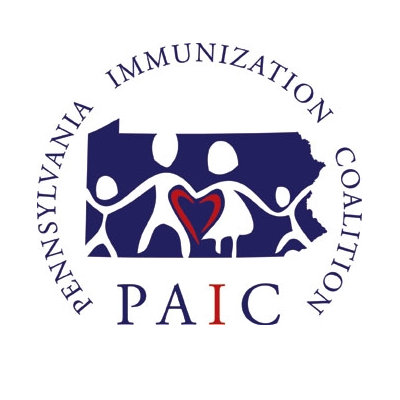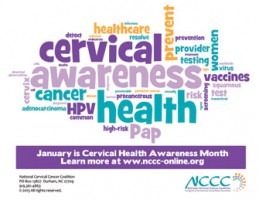January – Cervical Health Awareness Month
The United States Congress designated January as Cervical Health Awareness Month. Nearly 13,000 women in the United States are diagnosed with cervical cancer each year, but the disease is virtually always preventable with HPV vaccination and appropriate screening (Pap smear).
VACCINATION
HPV vaccines can help prevent infection from both high risk HPV types that can lead to cervical cancer and low risk types that cause genital warts. The CDC recommends all boys and girls get the HPV vaccine at age 11 or 12 as the vaccine produces a stronger immune response when taken during the preteen years. For this reason, up until age 14, only two doses are the vaccine are required. The vaccine is available for all males and females through age 45 but, for those 15 and older, a full three-dose series is needed.
TESTING
A Pap test can find cell changes to the cervix caused by HPV. HPV tests find the virus and help healthcare providers know which women are at highest risk for cervical cancer. Pap and HPV tests (either alone or in combination) are recommended for women over 30: each woman should ask her health care provider how often she should be screened and which tests are right for her.
http://www.nccc-online.org/hpvcervical-cancer/cervical-health-awareness-month/
UPDATES
EDUCATION:
- Webinar: HPV from an Oncologist’s PerspectiveHPV and Immunizations: A discussion about the Human Papillomavirus from an Oncologist’s Perspective. What can be Prevented with this Vaccination.When: Thursday, January 9, 2020, 3:00 – 4:00 PM ETWhat: Karen Zempolich, MD, Gynecologic Oncologist at Monarch Women’s Cancer Center in Salt Lake City, will share about the HPV virus from an oncologist’s perspective. Continuing education credit is available.
- A 16-Year-Old Boy in the Clinic for a Sports PhysicalCME/CE Credit for Physicians and Nurses
In collaboration with WebMD and The Yellow Umbrella Organization, ASHA has developed an activity, A 16-Year-Old Boy in the Clinic for a Sports Physical, for pediatricians, nurses, and primary care physicians. The goal is to reinforce knowledge of the indications for HPV vaccination in males.Upon completion of this activity, participants will have greater competence related to- Implementing the Advisory Committee on Immunization Practices (ACIP) immunization recommendations for human papillomavirus (HPV) vaccination among males
Author: David L. Bell, MD, MPH
Associate Professor of Pediatrics at Columbia University Medical Center; The Young Men’s Clinic, New York, New York
Disclosure: David Bell, MD, MPH, has disclosed no relevant financial relationships.For Physicians
Medscape, LLC designates this enduring material for a maximum of 0.25 AMA PRA Category 1 Credit(s)™. Physicians should claim only the credit commensurate with the extent of their participation in the activity.For Nurses
Awarded 0.25 contact hour(s) of continuing nursing education for RNs and APNs; 0.25 contact hours are in the area of pharmacology. - An 11-Year-Old Girl Due for VaccinationsCME/CE Credit for Physicians and Nurses
In collaboration with WebMD and The Yellow Umbrella Organization, ASHA has developed an activity, An 11-Year-Old Girl Due for Vaccinations, for pediatricians, nurses, obstetricians and gynecologists, and primary care physicians. The goal is to provide guidance on responding to human papillomavirus (HPV)-vaccine-hesitant parents.Upon completion of this activity, participants will:- Have greater competence related to incorporating recommendations from the Advisory Committee on Immunization Practices for HPV Immunization into routine care/visits
- Have improved performance with regard to providing a strong recommendation for HPV immunization
Author: Ina Park, MD, MS
Associate Professor, University of California San Francisco School of Medicine; Medical Director, California Prevention Training Center, Oakland, California
Disclosure: Ina Park, MD, MS, has disclosed no relevant financial relationships.For Physicians
Medscape, LLC designates this enduring material for a maximum of 0.25 AMA PRA Category 1 Credit(s)™ . Physicians should claim only the credit commensurate with the extent of their participation in the activity.For Nurses
Awarded 0.25 contact hour(s) of continuing nursing education for RNs and APNs; 0.25 contact hours are in the area of pharmacology.
DOWNLOADS
WEBSITES:
CDC’s HPV website offers accurate information and resources on HPV for all.
The American Cancer Society provides information on HPV and Cancer.
The American Sexual Health Association (ASHA) National HPV and Cervical Cancer Prevention Resource Center– resources include advocacy information, hotline services, publications, support groups and postdoctoral research from the American Social Health Association
National Cervical Cancer Coalition offers resources for women with cervical cancer, includes section devoted to survivor stories
Cervical Cancer Free American (CCFA) Offers resources from a collection of updated medical facts, policy updates, and organizational literature
Vaccines.gov provides resources from federal agencies for the general public and their communities about vaccines across the lifespan.
Children’s Hospital of Philadelphia provides questions and answers about Human papillomavirus (HPV) from the Vaccine Education Center.
Immunization Action Coalition offers free information and downloads for healthcare providers, coalitions, and parents.
OTHER RESOURCES:
- 5 things you should know about cervical cancer
- Cervical cancer 101: 8 FAQs
- Quiz: Do you know what causes most cervical cancers?
- Infographic: Cervical cancer prevention
- 3 tips for preventing cervical cancer
- Should you get screened for cervical cancer?

